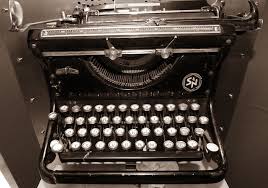 Scumble
Scumble
Rae Armantrout
What if I were turned on by seemingly innocent words such as
“scumble,” “pinky,”
or “extrapolate?”
What if I maneuvered conversation in the hope that others would
pronounce these words?
Perhaps the excitement would come from the way the other person
touched them lightly and carelessly with his tongue.
What if “of” were such a hot button?
“Scumble of bushes.”
What if there were a hidden pleasure
in calling one thing
by another’s name?
~~ ~~ ~~ ~~ ~~ ~~
The deep dark is gone – 4:30am and already the birds are awake, and at 5, the light has come to the sky. Just a little light, but it’s light enough. 20 minutes and this body is tight and full of aches, trying to be a 20-year-old on the dance floor again. What does it take to change the names we call ourselves, to call ourselves by new names? We’ve used the old names so hard and for so long, the grooves they’ve carved in us are the shape of us, or so we tell ourselves. Or so I tell myself.
Once upon a time, it was all made up – doctor or princess, you be Danielle and I’ll be Steve and we’ll make a house here under the maple tree in your backyard and pretend that your little brother is our baby. Are those the kinds of names I’m talking about? The tea steeps in its plastic bottle. Heaven sends all its pretty angels to save me. What name can you have when all the rest have been shed, when even your own has slipped its meaning? This is a tight writing this morning. I can’t find the way in yet. Twenty minutes is a long time until it feels like no time at all. What if the names for you could be cantankerous or Constantinople, what if the name for you could be now or noise or numinous or nocturne? What if the name of you could be swell or swale or swish? We have these heavens of possibility inside of us all the time, every minute of every thirsting, and if you wanted, you could call yourself new. You could call yourself new. You could call yourself outside the things that broke you, the things that took your trajectory, the things that took your breath and gave only some of it back. You could call yourself inside the just about to blossom daffodil you could call yourself the glass of water you could call yourself the tender inside of the cottontail’s mouth. You could find your name in the sand or on the rocks, you could open the dictionary blindly and put your finger down on your future. Do our names direct us or do we shape the hope of our names? Consider the collection of appellations for yourself that live behind your heart, that trace the shape of your spine. Consider what they might want from you, and whether you want to pay that price anymore. You get to choose what it takes to call you to attention, what it takes to bring your body into motion. You get to choose whether curses and diatribes deserve you anymore. You get to choose whether meanness is what you want gathering up your reins.
On the beach, every object has a name, every shape of every pulse and push of the sea, every curve on the beach, every grain of sand, every shell, every bird, every feather of every bird. I don’t know most of those names, even a small heartbeat of them. I only know their colors and sounds; I am beginning to know their inhales and exhales. The grasses have a name and the dirt beneath the grasses, each small animal climbing through the dirt beneath the grass: not just an ant but a kind of ant, a kind of worm, a particular spider, a particular cockroach or termite or chipmunk or vole. What changes in us when we let ourselves know the specificity of the world around us, the land we inhabit, the place we live? What happens when I learn the names of the grasses in the marsh, the trees, the rushes, the ducks, the frogs? Do the peepers have a name other than peepers? If they do, please don’t let me know it. Not yet. I don’t want that nighttime sound to take another shape in my mouth just yet. There is specificity to every piece of the world. There is a name for the part of each thing named. There is a name for each part of myself, too. I don’t know most of those names, not for most of my muscles or bones or breath sounds or heartbeats. Maybe the old generalizations don’t serve anymore. Maybe my name could have some hope in it again, like my mornings could, or my dreams. I can’t find it yet. I pull the old dictionary down from the shelf, the thrift store one, the one that smells of old paper and burnt hair and a little mildew. I set it on the rug and fold myself cross-legged next to it, then close my eyes and open to a middle page. I put my finger down and it slips a bit before I open my eyes, the new name of me calling it, maybe. Now look, see what it says.
